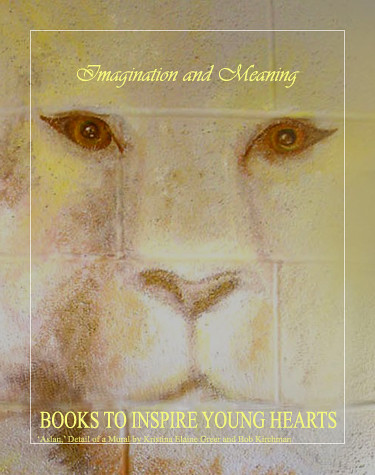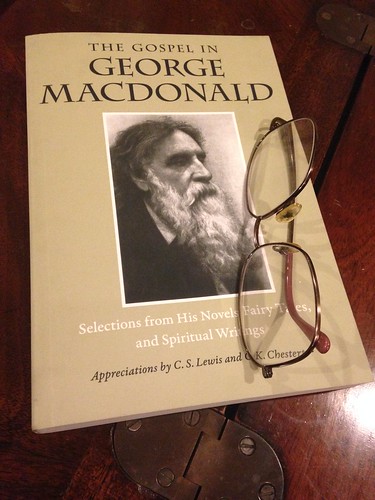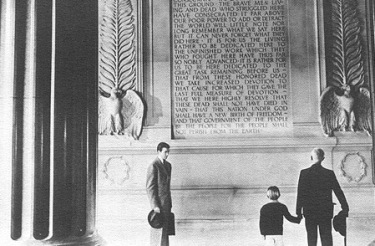
Volume XII, Issue XIII
Imagination and Inspiration
For me, reason is the natural organ of truth; but imagination is the organ of meaning. Imagination, producing new metaphors or revivifying old, is not the cause of truth, but its condition. -- C.S. Lewis, Selected Literary Essays (1969).
The Lion, the Witch and the Wardrobe
The BBC Production of these classic stories is pretty faithful to the original works.
The story began, C. S. Lewis recalls, with a childhood image he had of a faun carrying a parcel and an umbrella... not so much as a burning desire to write a classic allegory of the Christian Faith. But the work grew in scope and stature (Lewis initially thought it was terrible) and now is considered essential reading for young people. Thankfully Lewis resurrected his manuscript which was inspired by war evacuee children he hosted at his Oxford home and his Goddaughter, Lucy Barfield.
His friend and colleague, J. R. R. Tolkien, also wrote works of modern myth as the 'inklings,' as they called themselves, sought to create a legendary literature for modern times. Lewis once opined to Tolkien that it was a shame the great myths were not true, to which Tolkien responded that they in fact contained great truths. Lewis realized that the desires that could only be satisfied in Faith were expressed in the great stories. Lewis, who had abandoned his Faith as a young man, embraced it again largely as a result of this realization.
Originally intending to become a poet, Lewis would go on to produce serious works of apologetics as well as wonderful fantasies. Today he is probably best known for Narnia, but his Ransom Trilogy and other fiction join with his scholarly works to create a very impressive body of work. Narnia is a good starting point, but his 'Mere Christianity,' a publishing in book form of a series of talks Lewis gave on BBC Radio during the war, is also well worth pursuing.
The Work of Inspiring
In tumultuous times such as ours, it is important to remember that the work of inspiring young people goes on, whatever the state of the culture. C. S. Lewis lived through two great wars, fighting in the first one, and inspiring his embattled people on the radio during the second. We must not neglect this important work in our own era.

Lewis found inspiration in the writings of Scottish writer George MacDonald. A new book by Plough celebrates the spiritual insight of the man C. S. Lewis considered his primary inspiration. The Gospel in George MacDonald brings the work of this important, but now largely neglected writer to serve as an inspiration to a whole new generation of readers. Introducing the work, Marianne Wright writes of MacDonald's clear vision: “I do care to live – tremendously, but I don’t mind where. He who made this room so well worth living in, may surely be trusted with the next!”
Love of life and an uncomplicated trust in its Author: these are the gifts George MacDonald offers his readers. In an age when the daily news seems increasingly complex and terrible, it is high time for many more to discover with him the joy and promise of simple discipleship. As he wrote to a friend near the end of his life: “Then hail to the world with all its summers and snow, all its delight and its aching, all its jubilance and its old age. We shall come out of it the sons and daughters of life, of God himself the only Father.” -- Marianne Wright
Lewis would credit... George MacDonald with having influenced virtually every word he ever wrote.... It began with Phantastes, a dreamlike tale in which a boy wishes to visit fairy-country. He awakes the next morning in an enchanted wood where he encounters profound happiness mixed with perilous adventure — including death and rebirth of sorts.... And so, thanks to the imagination of George MacDonald, C.S. Lewis found his way home." -- Kurt Bruner, Birthing Narnia
Lewis himself said of MacDonald: “The quality which had enchanted me in his imaginative works turned out to be the quality of the real universe, the divine, magical, terrifying, and ecstatic reality in which we all live. I should have been shocked in my teens if anyone had told me that what I learned to love in Phantastes was goodness. But now that I know, I see there was no deception. The deception is all the other way round – in that prosaic moralism which confines goodness to the region of Law and Duty, which never lets us feel in our face the sweet air blowing from “the land of righteousness.”
I regarded George MacDonald as my master: indeed I fancy I have never written a book in which I did not quote from him." --C. S. Lewis

A Vision For Work and the World
Let thy work appear unto thy servants, and thy glory unto their children. And let the beauty of the Lord our God be upon us: and establish thou the work of our hands upon us; yea, the work of our hands establish thou it." -- Psalm 90:16-17
In the book The Poverty of Nations, A Sustainable Solution [click to read] by Wayne Grudem and Barry Asmus. It examines the reasons successful nations are successful and how successful nations can forget the roots of their success and fall into decline. Like Alvin Schmidt's Under the Influence [click to read], the book does not hide the influence of Biblical principles in advancing the state of humanity. As many in the academy and the media today criticize free markets, Grudem and Asmus point out that the flaws are not necessarily a flaw in free markets, but in human morality. If a people have no moral barrier to it, markets will indeed deliver drugs, slaves and a host of evils, but that is not necessarily a fault of a free market. Indeed the attempts of government to control such evils will inevitably cost far more than imagined and have far less effect on curtailing the evils than proponents of such action desire. Thus the authors show how the Rule of Law, Respect for Property and Good Leadership are all essential for national prosperity... these things being rooted in values presented in the Bible.
Markets, influenced by morality, are actually quite fertile for creativity. When the slave trade was ended in England by William Wilberforce, the initial result was the economic decline of the port of Bristol. Creativity responded to the need as Isambard Kingdom Brunel built the Great Western Railway and steamships to link Bristol to America. The heart of George Müller ministered to Bristol's cast off children, but it was possible largely due to the creativity that linked Bristol to the economic pulse of the world. In fact, Grudem and Asmus point out that a wonderful coming together of talents and resources occurs in markets that requires no huge agency of oversight. In a simple little story called I Pencil, the beauty of this phenomenon is wonderfully illustrated.
I Pencil.
No single person on the earth could make a pencil without the help of countless others."
Read, Leonard E., "I, Pencil: My Family Tree as told to Leonard E. Read." [click to read] 1999. Library of Economics and Liberty. 5 February 2014.

Jimmy Stewart's classic film: Mr.Smith Goes to Washington.
Everyone Should See this Film
This Classic Tale [click to watch] of a man of integrity who finds himself in the United States Senate, and who ultimately has to fight for that integrity, is one that we would do well to heed today!
The film was made in 1939 and Frank Capra reminds us that human nature in the period preceding the great war was not so different as it is now.
Capra was able to make this film so good because he both believed in the American ideal, and understood how easily it could be co-opted and undermined by the unscrupulous and the greedy. America, he's telling us, should be celebrated because it’s the kind of country that can produce a Jefferson Smith; but at the same time, we must always be on our guard, because it’s also capable of destroying one.” -- Gina Dalfonzo [1.]

WONDER Show Opens
[click to read]
To cease to wonder is to fall plumb-down from the childlike to the commonplace-the most undivine of all moods intellectual. Our nature can never be at home among things that are not wonderful to us.”
― George Macdonald
(read more)
